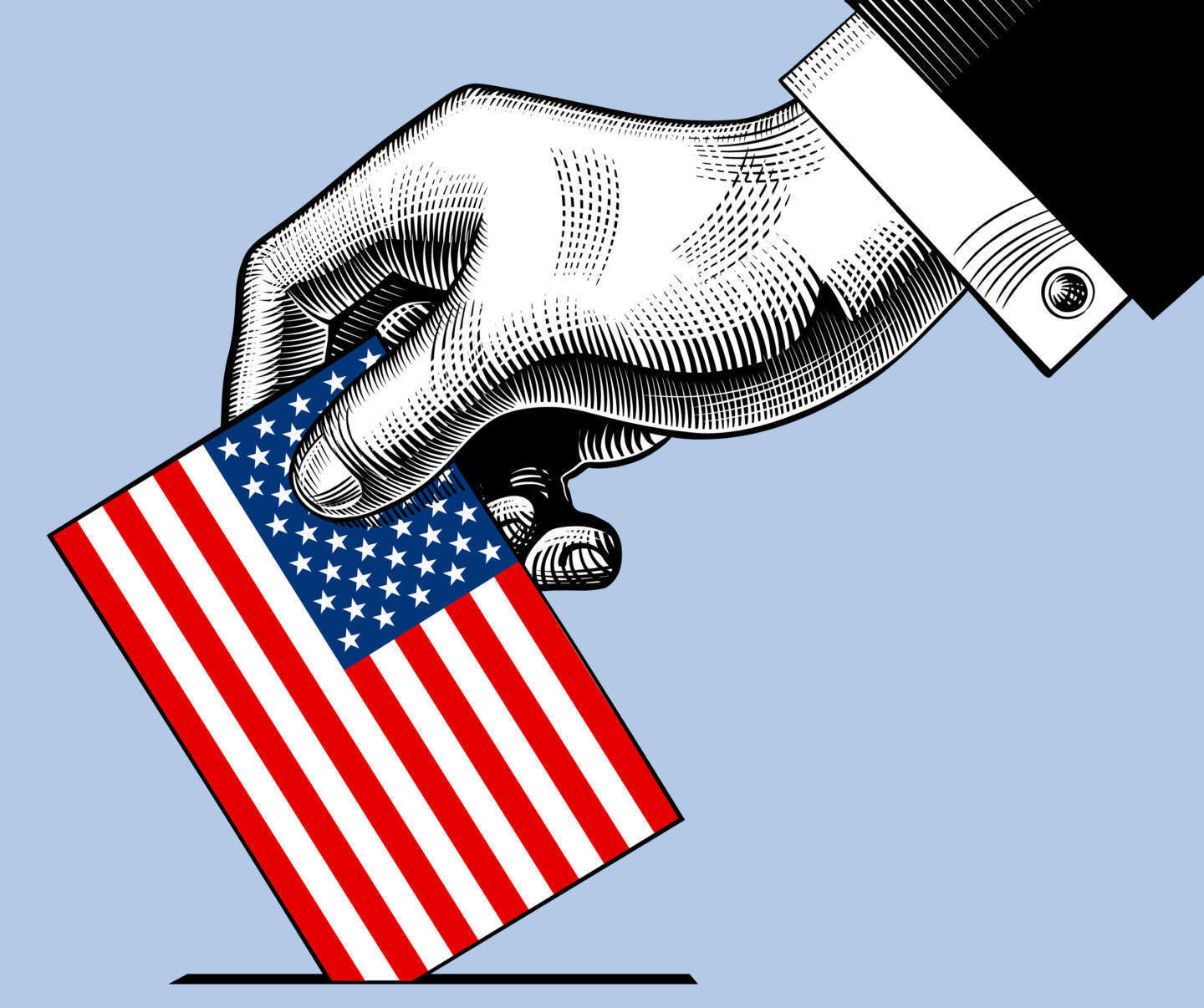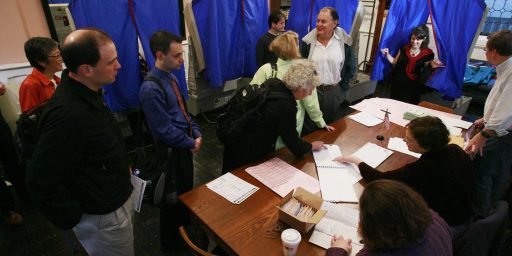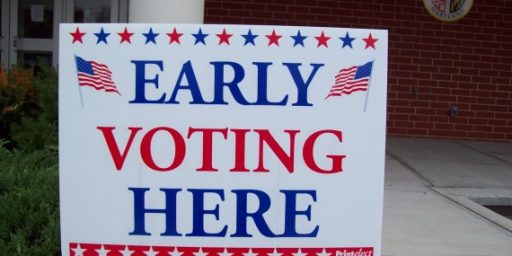Voting From the Grave
When early voting meets tragedy.

For some reason, CNN thought their story headlined “A 20-year-old woman cast her ballot early before dying of cancer. Her state will throw it out.” worthy of calling to my attention by sending an alert to my phone.
Obviously, that a very young woman—I have a stepdaughter whos 21 and a stepson who just turned 20 last week—has died is a tragedy. But, surely, she should have no say from the grave about who governs the country?
It turns out, however, that there’s far from universal agreement on this:
She is one of several dozen Wisconsinites whose votes will be canceled because they passed away after voting early, according to state Elections Commission data provided to CNN through a public records request.
[…]
States around the country are divided on whether to count votes from people who cast an early ballot and then die before Election Day. At least a dozen states allow it, more than a dozen others reject those votes, and laws in other states are unclear, recent research from the National Conference of State Legislatures found.
Among the most crucial swing states, Wisconsin, Iowa, Michigan, North Carolina and Pennsylvania don’t count early ballots cast by voters who die before Election Day, while Arizona, Florida, Georgia and Ohio do, according to the NCSL and state elections officials.This year, when record numbers of Americans are casting ballots early and coronavirus cases and deaths are spiking in some states, it’s not just a speculative question. The rules mean that even as Covid-19 has become the defining issue of the presidential race, voters who die in the pandemic won’t have their votes count in some states.
To me, the outrage is not that those who have died are dealt the posthumous blow of having their vote canceled but rather the opposite case: those who are literally voting from the grave. Why should their preferences have an impact that could potentially last decades?*
As I’ve noted in previous posts, my preference would be to maximize the ease of voting for eligible citizens but to have voting done instantaneously so that all are voting with the same information. Given, however, that the former is decidedly not the case and the latter is impractical and disproportionately burdens the less-well-off, allowing early voting is a reasonable concession.
President Trump and Republican officials across the country have been trying to delegitimize mail-in voting, in particular, as “corrupt.” There’s no evidence for this charge.
But it seems obvious that we should take reasonable measures to ensure that those who are not eligible to vote do not do so. The dead are at the very top of that list.
Incidentally, while one presumes that the young lady who inspired the CNN headline was a Biden supporter I would think the policy in Wisconsin and that I advocate be universal would disproportionately impact Republicans. While the electorate as a whole is aging (at 54, I’m just barely above median age for a registered voter), the oldest voters have long been more likely to vote Republican. (Although there’s some reason to think Biden will reverse that trend this go-round.)
_____________
*US Senators have six-year terms, the longest of any nationally-elected office. But Presidents and Senators nominate and confirm federal judges to lifetime appointments.






I live in Illinois. I voted early at the County Courthouse not mail in. I’ll be 73 two months from Election Day. I could drop dead before next Tuesday.
There is no way to match my name with the ballot I cast.
How are the county election officials going to know who I voted for?
—————-
Well lookee there! It’s the Edit function!
All I can add to this is DUMP TRUMP 2020!
@Mister Bluster: I know there are procedures for mail-in ballots but don’t know whether there are for early in-person voting. If not, that’s another rather powerful reason to oppose the practice.
@James Joyner:..procedures for mail-in ballots…
I am confused. Are you saying that mail-in ballots are not secret ballots?
What about ballots sent from overseas by military personnel?
———-
This time I had to reload the page one time for the EDIT function to appear.
Isn’t that true of any older voter? Why should some 90-year-old have a say in an election of potentially decades-long impact when they probably won’t live to see the end of the decade we’re in now?
Honest question: If I die on Nov 4th, should my vote be cancelled? If I die as I walk out of the voting booth, should my vote be cancelled?
According to the CDC (as of 2017–pre-COVID) 7,700 people die every day. There are 79 days between Election Day and the Inauguration. That’s 608,000 people. Why should those of them who voted get to decide the future of the country?
The woman in question voted in accordance to the law and was alive when her vote was cast.
It must be counted.
@Mister Bluster:
They’re subject to verification so that we can ensure people don’t vote by mail and then again in person.
@Mikey:
To some extent, sure. But they’re alive and will, for some period of time, be impacted by the outcome of the election.
@Mu Yixiao:
No; the election is on Nov 3rd.
Essentially, Wisconsin law has early voters cast provisional ballots. Their death, rightly in my view, cancels the ballot.
The answer to this problem is to have an open voting period, When you vote within that period, in person or by mail, your vote counts regardless if you begin the transition to dust before election day.
@James Joyner:
Please reconcile that with this:
You’re arguing “future impact” on one hand and “technical deadlines” on the other.
If your argument is about future impact, then you’d have to disqualify about 6,000 people a day for… some arbitrary amount of time after the election–because their “dead” vote is impacting the future. Statistically, that would be about half a million possible votes between election day and the inauguration.
If you insist that “election day is Nov 3rd”, then why allow early voting at all?
And, given the current political climate–and the deaths from COVID-19 of approximately 3,000 potential voters every week–why shouldn’t those voices be heard? I’d argue that their voices are the ones we really need to listen to.
@James Joyner:
What if a voter dies on December 31? The new Congress won’t yet be sworn in, and in the event a new President is elected, he/she won’t be inaugurated for almost another three weeks. The outcome of the election will have very minimal impact on that voter.
I mean, you can make good arguments addressing when to consider a person has “voted,” and whether or not to count an early/absentee vote if the voter passes on between casting/mailing the vote and Election Day, but I don’t think this particular rationale is a good one.
And it really completely ignores the fact a lot of people aren’t considering only their own interests in voting, but those of their children and grandchildren and the interests of having a nation that benefits everyone 100 years from now.
@Mu Yixiao: According to the FL website my mail-in, actually dropped off, ballot has been opened, tabulated, and is now irreversible.
Back of the envelope – You say ~7700 people a day die. We’ll see maybe 150 million votes out of a population IIRC around 330 million, so something like 3500 would have voted. Assuming the average early vote is cast a week before the election, that would be something like 25,000 voters who subsequently died before Election Day. Nationwide. Out of 150,000,000. And as James notes, there wouldn’t seem to be a big partisan skew. I’m afraid, James, I’m going to be hard put to care one way or another.
@James Joyner:
Things vary by state. My mail ballot (returned via drop box, not USPS) was received, verified, and counted. If I drop dead today, there’s absolutely no way to determine which ballot was mine.
@Sleeping Dog:
I’m fine with that if the voting period is three days but not if it’s three months.
@Mu Yixiao: @Mikey: At some point, the election has to be over. I think ten weeks between the vote and the inauguration is way too long but that’s really a separate problem.
Sorry, but I’m on the other side. From a Platonic perfect world viewpoint, I can see the argument. However, having to figure out whether a ballot-by-mail corresponds to someone living or someone who has kicked off between the date it was signed and Election Day is just too much of an extra hassle to place on the state, given they’re already having problems getting all the ballots counted in a reasonable time. It’s even worse when you have states that start tallying all the absentee ballots as soon as they receive them, rather than wait until Election Day–they would conceivably have to check each name twice.
Also, you’re just creating incentives for people to shove the dead body of Aunt Erma in the closet for several days until she can “die” after the election, no?
Is this another one of those romantic “we’re all voting over the same weekend” things that I find incomprehensible? Because it kinda feels like I’m listening to someone explain why a meet-cute is a great way to find the love of your life, again.
@James Joyner:
The number of early votes cast by people who then die before election day must be rather small, just as the # of actual fraudulent voters is also very small. I just can’t get all worked up about it. Besides, as Mikey points out, there are probably thousands more who die between the election and when anyone takes office and we don’t worry about them.
I just want to add, “Don’t let old fvcks like me decide your future! VOTE!”
Did RBG’s vote get counted?
@James Joyner:..I’m fine with that if the voting period is three days but not if it’s three months.
This year in person early voting in Illinois started 40 days before the election.
@Mister Bluster: We no longer have an election day, we have election season and the vast majority of voters seem to like it. James is just going to have to get used to it and stop screaming at this particular cloud to get off his lawn.
In corporate law, there is a thing called the “record date” which decides who is a shareholder for some designated decision. The record date is normally set some month or months before the voting closes, whether by mailed-in proxies or a meeting called for the vote. For publicly held corporations, shareholders come and go daily. The record date also allows those advocating corporate decisions to know who their constituents are and aren’t. If you are a shareholder on the record date, you get to vote even in you sell the day after or bought the day before.
While I understand James’ goals, you cannot manage even a corporation that way, let alone a country. Setting election rules – whether its a one-day voting period, a one-month voting period or a 40-day voting period, needs to accommodate not only political goals, but administrative limitations. A kid who turns 18 on November 1 doesn’t have any better or worse incentives to vote than one who turns 18 on November 4. The fact that one can and one can’t is simply an administrative limitation. The same is true of a death date. While I understand that live till Election Day is simply the rule in many states and is defensible, it is hardly a natural platonic best case. It’s just a thing, and, along the way, a thing that complicates longer election periods for negligible impacts.
In my opinion, if you are alive when you are able to vote, and cast a vote, the vote should count.
I am with Mu: there is no operative difference, IMHO, between what happened in the story above and me voting and then being hit by a bus on Tuesday after I voted.
I think we need to break out of the Election Day paradigm. We have a voting period, not a voting day.
@grumpy realist:
You had me up until here. I love the idea of people having to pretend Erma is still alive.
@James Joyner: If you don’t want dead people voting, then why have it around Halloween? Huh?
Until we can have any adult citizen in America able to vote without waiting more than about half an hour, the number of votes affected by all the Aunt Ednas voting and then dying is nothing compared to the votes affected by other problems.
Ideally there would be a standard across all states, sure. Could even go with the must be living on November 3rd to create Weekend At Aunt Edna’s.
But in the reality we live in, it is insignificant noise. It’s like discovering that John Wilkes Booth wore white shoes after Labor Day — possibly true, but missing the big picture.
What’s the cutoff point? If I were to forget my ID when I go to vote on Nov. 3 and therefore be required to cast a provisional ballot, and then die before the ballot is counted (provisionals are counted last), should my vote be thrown out?
If a soldier does everything right and votes absentee from overseas and gets killed by an IED *on* Nov. 3, should his/her ballot be thrown out?
I kind of think that if you cast a vote, legally, that vote should count.
@Jen: what if he’s killed in Iraq at 7:01 pm Arabic Standard Time, one minute after the polls would close, but that is 11:01 in the morning Eastern Time, where he’d normally be voting in North Carolina?
@David S.: No, I think this is just Dr. Joyner making an argument that disenfranchisement is not always wrong because sometimes it happens by act of legislature.
@Teve: Exactly.
It’s introducing complexity into a system that is straightforward.
States, per the Constitution, have the right to establish these parameters. To me, a vote that is valid *when it is cast* is a vote that should be counted.
@grumpy realist:
I’m with this. It is too trivial an issue to justify putting the election personnel to the hassle of dealing with it.
This is an interesting debate. There seem to be two competing principles being argued. I don’t really have a strong view one way or another as they both seem to have merit.
Here in Colorado, a vote can be invalidated if the voter dies before the vote is processed. But as a practical matter, I don’t think that happens very often. Since we are a home rule state, each county has the option to start counting votes early and most do, especially this year, so that the results can be more quickly tallied on the actual election day (we’ve had an effective and robust early/mail voting system for 7 years now). Once the outer envelope is validated, the ballot is removed and will be counted regardless of circumstances.
Another thing to consider is what mechanisms exist to share information that a voter has died. A death certificate may not be issued until several days after a person’s death and it’s not clear – to me at least – how closely county vital records departments are integrated with the offices that handle voting. Here in Colorado, both of these are at the country level, but in different departments.
Another related issue is when young people can register to vote and whether they can vote in primaries before turning 18. There are some interesting differences among states on that.
@Steven L. Taylor:
We have voting periods – depending on the state, these voting periods can vary from 5 to 46 days for federal elections.
In theory, states could start their early voting period months before the election – as soon as the deadline for ballot access is reached. Looking at the state-by-state list of ballot access deadlines, it’s July and August for most states, with North Carolina being the earliest – March!
I think there needs to be a limiting principle here somewhere.
If you legally cast a ballot, it should be counted period. If you are ok with the idea that death between casting the ballot and Election Night invalidates the vote, would you be OK with letting 17yr olds with birthdays in late Nov or Dec get to vote early to balance it out? Thousands of future voters are getting screwed for being born a few days too late and there’s more of them then dead voters.
If we care about future intent, why aren’t we letting them be heard? Oh wait- it’s all about limiting votes, not expanding them.
The NY Times is reporting that the Trump campaign is now milking online supporters for weekly donations through December. For a lengthy and expensive legal fight…
@KM:..Thousands of future voters are getting screwed for being born a few days too late.
I know that feeling. I turned 21 January 3, 1969 barely 2 months after Richard Nixon was elected. The 26th amendment to the US Con was not ratified till July 1971.
Getting screwed out of voting wasn’t the worst of it.
American males were getting drafted and sent to the jungles of Vietnam to get their heads blown off and they could not vote the bastards out of office that were sending them there.
Meanwhile, Texas Republicans Ask Federal Judge to Throw Out 117,000 Legally Cast Ballots
You ask an interesting question and in good faith. The simple principle that seems to cover most cases is that if the ballot was cast legally, it counts. We can have other rules, applied evenhandedly and with good faith, that would also work.
But I’m not seeing any good faith coming from the Trump camp. The above seems a lot more significant.
@James Joyner:
Before you get into this philosophic discussion of ‘right to influence governance’ after a citizen’s death, one thing that we need to agree on is the word: count
In Ohio, a mailed-in ballot is permitted to be “counted” beginning on October 6th (coincidently that same day that in-person early voting begins).
Ohio seems to be similar to Colorado, in that “counting” can occur many days prior to election day and may continue for days after election day (clearly UOCAVA ballots are accepted for counting for several days after election day).
But what is meant by counting? In Ohio (and likely Colorado) ballots are scanned as they are received (after the start date). They call this counting. At that point the ballots themselves can be put away for 22 months. Unless there is a recount or a court challenge to the count, there is no reason to look at the ballots again. So what does happen in this scanning process? The scanners read the voting selections for each office and each candidate and create a Excel-like spreadsheet where row #1 represents the first ballot scanned, row #2 is the second ballot scanned and so forth. In each of the columns are the offices and candidates. As each ballot is scanned, a character (say an “X” ) is placed within the cells for that row that represent the voters choice for each office and candidate.
As each ballot is scanned, the spreadsheet becomes longer and longer (more rows). These high-speed scanners can “process” more than 10,000 ballots an hour. But, until the designated election official commands that the number of “X”‘s are summed for each column (aka tallied), there are no election results, even though the ballots have been counted
That summing of the columns takes only a few moments, if all the ballots have been “counted”.
My ballot in Ohio has already been cast and counted. It is impossible to find my original paper ballot to discard it , in the event that I should die before November 3. Without my original paper ballot, no one would know which candidates ought to have votes deducted.
For those interested in these scanners : How ballots are counted.
hi speed scanner
@Jay L Gischer: who does “you” refer to?
@KM:
” If you legally cast a ballot, it should be counted period.”
ABSOLUTELY !!!
And I would add one other caveat: A voter has “cast” a ballot, when that ballot is no longer under his control ( e.g. given to the postal system, dropped in a election drop box, scanned at early and election day in-person voting locations).
Please release me from moderation !
@Mister Bluster: Fuck LBJ. (for Raven)